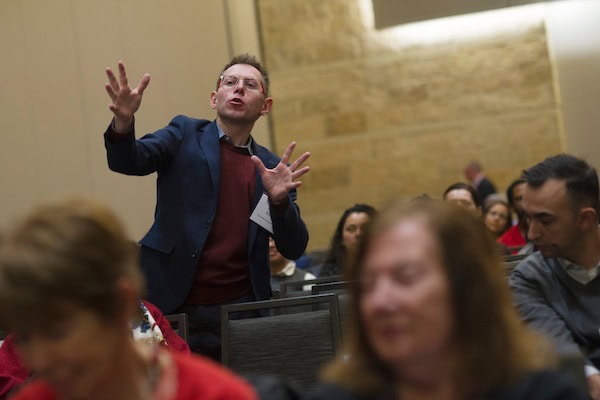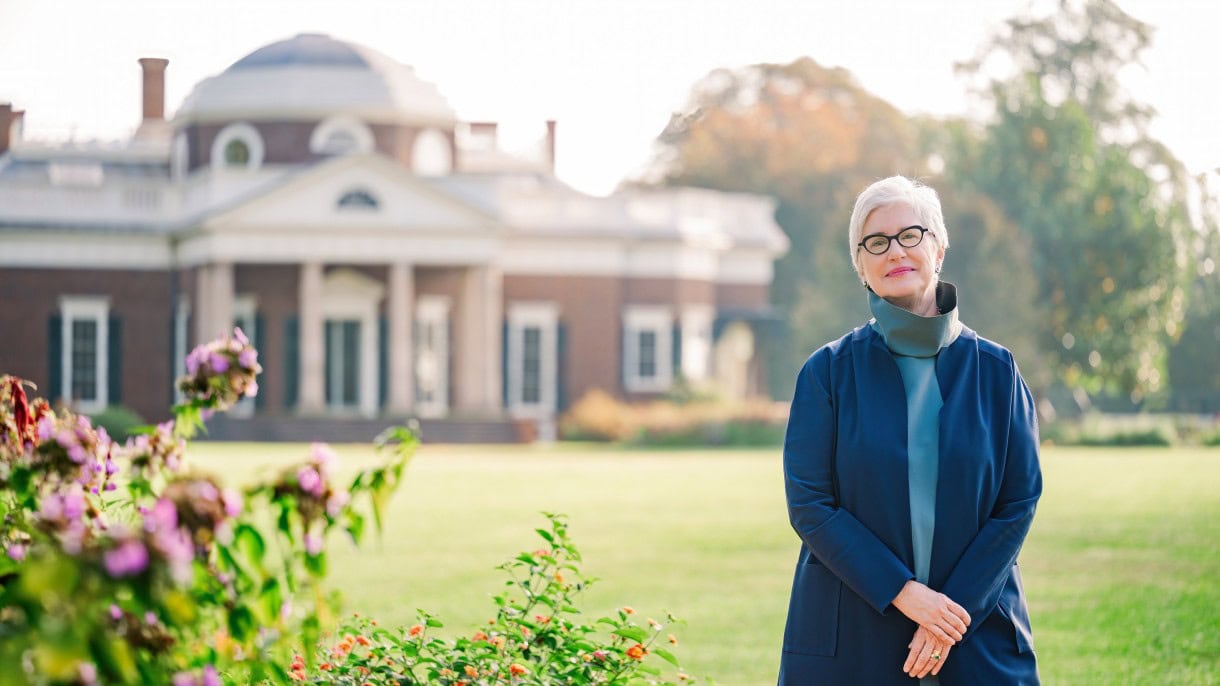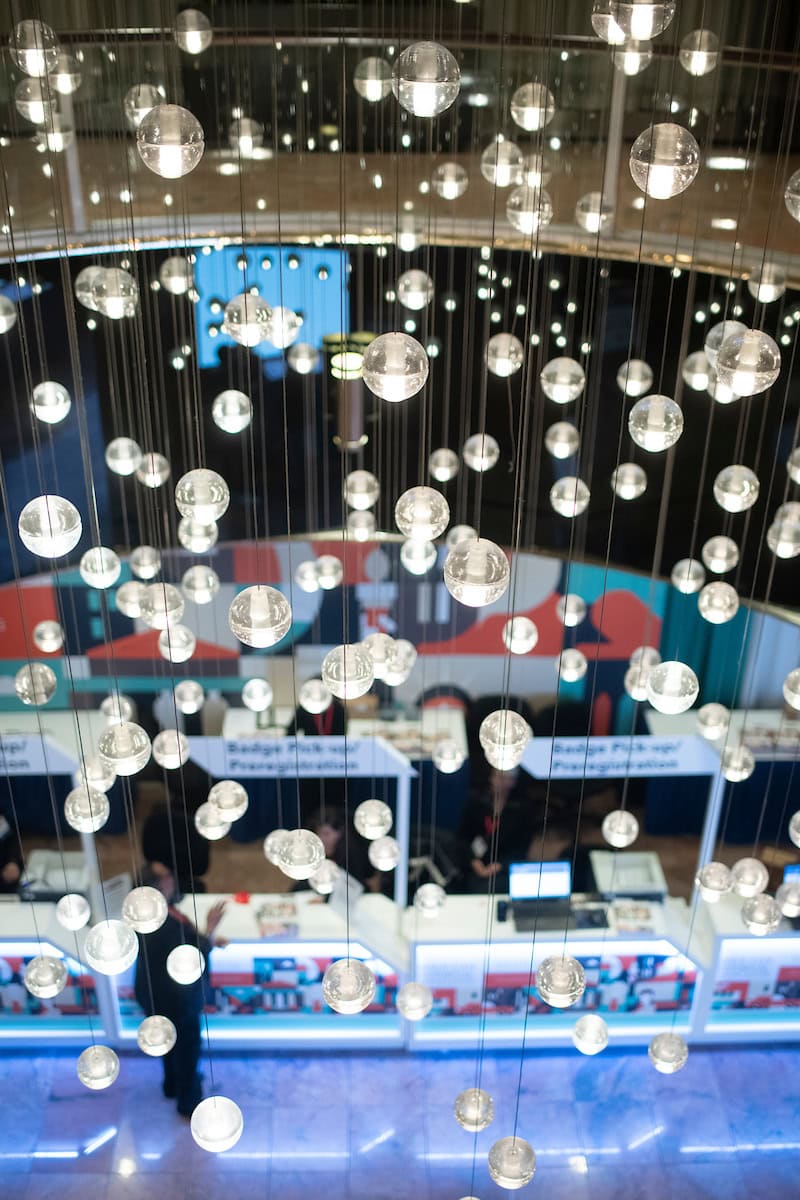
Annual meeting sessions (like this one in Denver 2017) elicit spirited conversation. Marc Monaghan
While the world has been preoccupied with the conduct of US democracy in the last few months, members of the AHA Program Committee have been busy soliciting and reviewing session proposals for the January 2018 meeting in Washington, DC. The program, which is still taking shape, promises not just a rich set of offerings but ample evidence—if we have need of it—that scholars and teachers and students of history across the country and the world are working hard to bring the past alive not just for the present, but for the future as well. We anticipate a program positively brimming with new historical research—and, as importantly, with ways of debating about history and its meanings in scholarly settings, in classrooms, and with the wide variety of audiences we aim to be in dialogue with as practitioners of the craft.
Program Committee members are well aware that our work can seem mysterious. Not only do we rank and select from the nearly 400 session proposals submitted each year, we actively solicit proposals and judge their suitability for inclusion. Typically, about 10 percent of the sessions that end up on the program have been solicited by the Program Committee.
Each year, the AHA president organizes sessions, too. These often deal specifically with the theme of the meeting, which the president also determines. (Many historians are under the impression that the Program Committee favors proposals that adhere to the theme, but this is not the case.) Under the intellectual leadership of AHA president Tyler Stovall, the 2018 theme is “Race, Ethnicity, and Nationalism in Global Perspective.” It is proving a timely guidepost for thinking about the present through the past.
One of the presidential sessions and plenaries being developed addresses the slave trade in global perspective, while another will focus on the Brexit referendum and its aftermath. We will hear about UNESCO and the problem of race, and we will commemorate the 25th anniversary of Thomas C. Holt’s The Problem of Freedom (1992). With the help of Program Committee member Trevor Getz and AHA Council member Jim Sweet, Stovall is also sponsoring a session in honor of Jan Vansina, one of the founders of the modern field of African history, who passed away in February 2017.
To round out a wide variety of proposals, the Program Committee is also working on sessions that deal with apartheid’s legacy; nativism and the politics of migration in post-1945 Europe; and C.L.R. James’s The Black Jacobins (1938) on its 80th anniversary. The year 2018 is, of course, a major commemorative year in many contexts, as we mark everything from the end of World War I to the global upheavals of 1968. We look forward to seeing how centenaries and commemorations at various scales leave their mark on the program as a whole. Among the session proposals that do cohere around the theme, there are several that engage categories of race, ethnicity, and nationalism in medieval, premodern, and early modern contexts, or challenge their presumptions altogether. If the theme is an orientation device, it also offers scope for testing the limits and possibilities of the categories themselves. Lively debates will be happening all over the program as a result.
There are many exciting ideas and proposals unrelated to the theme, of course. Some of them, like a panel on food history at the Smithsonian’s National Museum of American History, are linked to the city of Washington and its environs. Others, like a panel and a workshop on comics and history, explore genre and form at the boundary of word and image. Still others tackle questions that nearly everyone in the classroom now faces: how to combat declining enrollments; how to teach with and against the textbook; and how to make the most of digital tools.
Thinking outside the box when it comes to history teaching continues to emerge as an annual meeting subtheme. Be sure to bookmark the two-session workshop on the Frederick Douglass game sponsored by Reacting to the Past, an elaborate role-playing exercise. The game will be followed by an after-session featuring David Blight and Manisha Sinha reflecting on how this kind of embodied performance of historical ideas and figures can transform the way all of those who play it understand what history is.
There is sure to be a wealth of thoughtful panels on digital history that approach the many challenges entailed from a number of different angles. One that already catches my eye is “Arguing with Digital History,” a roundtable organized by Program Committee member Kathryn Tomasek that takes a key tenet of history practice, the argument, and asks how digital history tools and methods can refine and advance it. Tomasek has also organized a session on how to do global digital history on the “semantic web” through MEDEA (Modeling Semantically Enhanced Digital Edition of Accounts). And Craig Perrier, who teaches in the Fairfax County public school system and is also a member of the Program Committee, has put together a compelling session on transdisciplinary digital history in K–16 settings as an example of “collaboration in action.”
Thinking outside the box when it comes to history teaching continues to emerge as an annual meeting subtheme.
Unsurprisingly, perhaps, there are an extraordinary number of proposals that refract contemporary issues and crises through the prism of the past. “Race and Membership in Germany,” “New Histories of State Surveillance,” “Sexual Violence in Historical Context,” “The Culture Wars in Texas Textbooks”—each one sounds like it is taken straight from the headlines. There will also be a wealth of offerings on career development and diversity, as has been the case for several years, thanks to the AHA’s manager of academic affairs, Emily Swafford, and participants from many sectors and career stages.
There’s no denying the pressure of the present on our apprehensions of the past or, for that matter, our apprehensions about the future of the profession itself. As a matter of professional practice and intellectual conviction, we recognize that there are deep genealogies to everything that crosses our sight line, and we can hardly afford not to plumb those depths whenever and wherever possible. Even a quick glance at the list of submissions in the review portal suggests that historians are bringing their content and methodological expertise to many urgent questions, even as they are also energetically pursuing subjects that may have little or no direct connection to today’s political or social scene. That powerful combination—of historians both in the present and outside it—is evident, whether the subject is 20th-century partition politics or 18th-century Eurasian migration or scandalous behavior in the Inquisition.
There is one session I want especially to flag because I am certain it will be a big draw: “What It Means to Be a Citizen: Student Veterans in History Classrooms,” organized by Eladio Bobadilla, a PhD candidate at Duke University and himself a Navy veteran. This panel grew directly from an article of the same title that Bobadilla wrote for Perspectives on History in January 2017. The issues he raised—about stereotypes, the role of war experience, and the power of history to shape veterans’ pathways beyond the GI Bill—are worthy of greater public attention and debate. And that’s exactly what they will get in DC in 2018. So be sure to mark your calendar for the roundtable, which will feature remarks by Paul Ortiz, Steve Aronius, and Katherine Dahlstrand, all veterans of the US Army or the Marine Corps, in addition to being practicing historians.
Though we have yet to finalize our choices, I think the Program Committee would agree that there is abundant evidence that historians of all times and places are fully, even passionately, engaged in putting the discipline to work in the various settings we find ourselves in. If nothing else, the 2018 annual meeting program will be a snapshot of what’s happening now.
Antoinette Burton is professor of history at the University of Illinois at Urbana-Champaign and chair of the Program Committee of the 132nd AHA annual meeting.
This work is licensed under a Creative Commons Attribution-NonCommercial-NoDerivatives 4.0 International License. Attribution must provide author name, article title, Perspectives on History, date of publication, and a link to this page. This license applies only to the article, not to text or images used here by permission.


